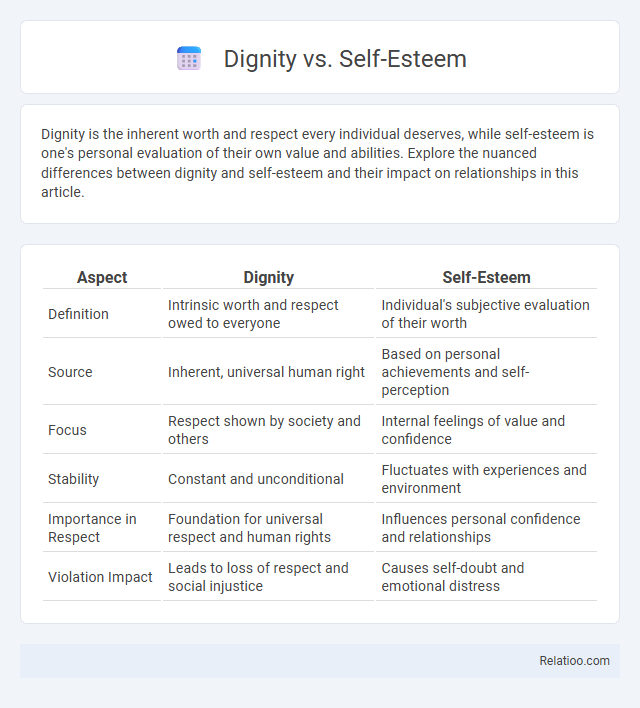Dignity is the inherent worth and respect every individual deserves, while self-esteem is one's personal evaluation of their own value and abilities. Explore the nuanced differences between dignity and self-esteem and their impact on relationships in this article.
Table of Comparison
| Aspect | Dignity | Self-Esteem |
|---|---|---|
| Definition | Intrinsic worth and respect owed to everyone | Individual's subjective evaluation of their worth |
| Source | Inherent, universal human right | Based on personal achievements and self-perception |
| Focus | Respect shown by society and others | Internal feelings of value and confidence |
| Stability | Constant and unconditional | Fluctuates with experiences and environment |
| Importance in Respect | Foundation for universal respect and human rights | Influences personal confidence and relationships |
| Violation Impact | Leads to loss of respect and social injustice | Causes self-doubt and emotional distress |
Understanding the Concepts: Dignity vs Self-Esteem
Dignity refers to the inherent worth and respect every individual possesses, independent of external achievements or opinions, while self-esteem is the subjective evaluation of one's own value based on personal achievements and social feedback. Understanding the distinction between dignity and self-esteem highlights that dignity is an intrinsic right, consistently present regardless of circumstances, whereas self-esteem fluctuates with success, failure, and external validation. This differentiation is crucial for fostering a stable sense of worth that is resilient against life's challenges.
Origins and Philosophical Foundations
Dignity originates from the Latin term "dignitas," signifying inherent worth and moral respect tied to human existence, deeply rooted in Kantian philosophy emphasizing autonomy and intrinsic value. Self-esteem, emerging from psychological theories, reflects an individual's subjective evaluation of their own worth, influenced by social interactions and personal achievements. Understanding your sense of dignity involves recognizing universal human rights, while self-esteem relates more to personal perception and validation shaped by societal and internal experiences.
Core Differences Explained
Dignity represents the intrinsic worth and respect every individual possesses, whereas self-esteem reflects your personal evaluation of your own value and abilities. Integrity ties closely to dignity, emphasizing consistency in actions aligned with moral principles, reinforcing how you uphold your own respect. Understanding these core differences helps you cultivate a balanced sense of worth, combining both internal confidence and inherent human value.
The Role of Society in Shaping Dignity and Self-Esteem
Society significantly influences dignity and self-esteem by establishing social norms and values that define respect and worthiness. Cultural expectations and social interactions shape an individual's sense of dignity, often determining how they perceive their inherent value independent of achievements. Conversely, self-esteem is more directly affected by societal feedback and validation, as personal successes and failures contribute to internal assessments of self-worth.
Psychological Impacts of Dignity and Self-Esteem
Dignity and self-esteem both significantly influence psychological well-being, with dignity focusing on an intrinsic sense of worth and respect, while self-esteem relates to one's evaluation of personal abilities and value. Maintaining your dignity fosters resilience and emotional stability, whereas strong self-esteem promotes confidence and motivation. The interplay between these concepts supports mental health by reinforcing a balanced and positive self-view.
Dignity in Everyday Life
Dignity in everyday life is the inherent worth and respect every individual deserves regardless of circumstances, often demonstrated through acts of kindness and ethical behavior. Unlike self-esteem, which is an internal evaluation of one's own value, dignity is an external recognition by others and society that upholds human rights and equality. Maintaining dignity fosters social harmony and reinforces moral principles in personal and professional interactions.
Self-Esteem and Personal Development
Self-esteem is a crucial aspect of personal development, reflecting how you value and perceive yourself, which directly impacts your confidence and motivation. While dignity relates to the inherent worth and respect you deserve as a person, self-esteem focuses on your internal assessment and emotional well-being. Enhancing self-esteem through positive self-reflection and goal setting plays a vital role in fostering personal growth and achieving a fulfilling life.
Cultural Perspectives on Worth and Value
Dignity, self-esteem, and honor are distinct yet interconnected concepts shaped by cultural perspectives on worth and value. Dignity often reflects an inherent human right respected universally, while self-esteem centers on individual feelings of worth influenced by personal achievements and societal feedback. Honor varies widely across cultures, often linked to social roles, family reputation, and communal expectations, affecting how Your worth is perceived and validated within different cultural frameworks.
Nurturing Dignity and Self-Esteem in Relationships
Nurturing dignity and self-esteem in relationships requires recognizing each individual's intrinsic worth and validating their feelings without judgment. Establishing open communication and empathetic listening fosters a safe environment where dignity is maintained and self-esteem grows. Prioritizing respect and encouragement strengthens emotional bonds and promotes mutual empowerment.
Practical Steps to Balance Dignity and Self-Esteem
Balancing dignity and self-esteem involves recognizing personal worth without relying solely on external validation, practicing self-respect through setting boundaries, and fostering resilience by embracing imperfections. Practical steps include mindful self-reflection to identify core values, affirming one's intrinsic value irrespective of achievements, and engaging in constructive self-talk to counter negative thoughts. Cultivating empathy towards oneself and others enhances authentic dignity and nurtures stable self-esteem, creating a harmonious internal balance.

Infographic: Dignity vs Self-Esteem
 relatioo.com
relatioo.com